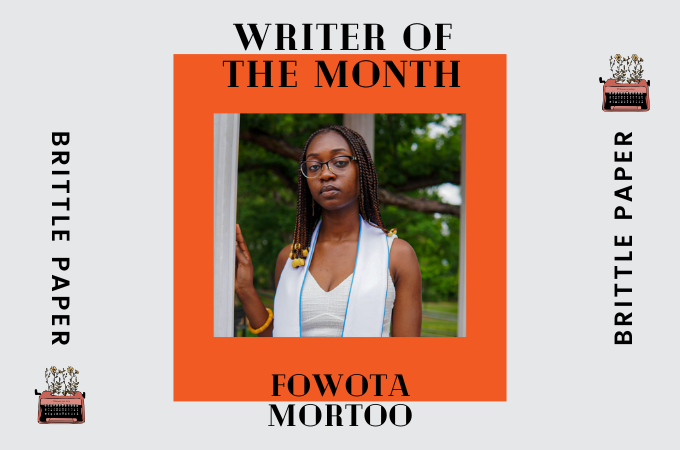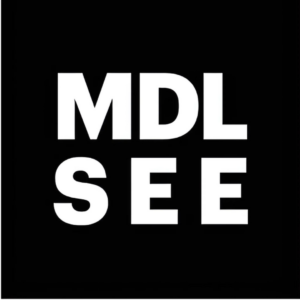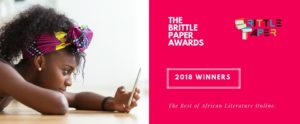
Brittle Paper’s Writer of the Month for December is Fowota Mortoo!
You may know Fowota Mortoo from her non-fiction piece, “Beyond Words”, published last month. However, she definitely keeps busy with so much more than just her creative writing. Fowota is a UNC Chapel Hill graduate who specialized in Geography and Global Studies. As of 2022, she is a fellow with PEN America, and a writer and researcher whose work examines the intimately reciprocal nature of narrative and space.
Deeply grounded in place and collective memory, her writing explores themes of ecology, indigeneity, coloniality, and language as a repository for cultural knowledge. Her research interests include coastal geographies, Afro-diasporic ecologies and knowledge systems, agroliberation, and educational spaces that foreground memory, critical thought, and creativity. She situates herself within a memory-keeping tradition and frequently draws upon oral histories to inform her work. Appreciative of an expansive understanding of story, she is also influenced by Africa’s visual and sonic heritage. With such a richly inspired pen, it is no wonder her essays have been finalists for the 2022 Craft Literary Hybrid Writing Award and the Long Short Story Award. Fowota was also selected for the National Humanities Center’s inaugural Undergraduate Leadership Council earlier this year.
If you thought she couldn’t be more impressive, take a look at our interview with our wonderful Writer of the Month:
Brittle Paper
Fowota, congratulations on being December Writer of the Month! Your piece “Beyond Words” was utterly beautiful. This piece is so short, so wholesome, and so effortless. It really is a testament to your talent that you can create a piece that is all of those things but also holds true to your influences of memory, space, and decoloniality.
How does someone become such a powerful writer?
Fowota Mortoo
Thank you so much—I appreciate it! I actually began writing this piece back in December 2020 and returned to it over a period of a few months before finishing. At the time, the interaction I describe in the story had occurred the previous year and I had held it dormant for months as one of those things that I just knew I wanted to write about. To be honest, I feel like over the past two years the way I write/what I write about has changed, and I don’t think I would have necessarily written this piece, or at least in the same way in the place where I am now.
But you asked about how I started. I started writing about my days when I was very young, around 7 or 8, and have continued every day since I was ten. So now I have volumes of journals, and I think this tendency towards memory-keeping continues to manifest in a myriad of ways and appears consistently in my work.
Brittle Paper
Talking about your love for memory-keeping, you mention Toni Morrison in the story. Would you say this is an inspiration to your writing or was it just for this particular piece?
Fowota Mortoo
I always find myself returning to her essay, “The Site of Memory.” It has been so formative in how I understand the writing process and how I think about memory and place more broadly. One part that especially resonates with me is her discussion of how her work is often perceived. The categorization of her work as “fantastic, or mythic, or magical, or unbelievable,” but really her opposition to it, illuminates the problem of presuming to establish the bounds of what is possible or rational in any sort of universal way, especially in the spiritual sense. And when we think about the violence that has sought to be justified on the basis of one group’s presumption of rationality over another’s (historically and presently), this question of perception assumes immense significance on and beyond the page.
Brittle Paper
When I was studying literature at varsity, I read Morrison’s essay alongside Frederick Douglass’ work. When I got to Morrison’s line, “the act of imagination is bound up with memory”, it became one of my favourite lines because it reflected and resonated with so many stories I was reading at the time, including my own writing. Also, it just acts as an example of how timeless and priceless Morrison’s words are.
Do you have a favourite line from the essay?
Fowota Mortoo
One of my favorites has to be: “That way I can explore two worlds—the actual and the possible.”
Brittle Paper
On that note, when we were working on the edits for “Beyond Words”, you corrected my error of categorising the piece as ‘fiction’. Was this piece ‘non-fiction’ because it was a personal experience or something that just did not feel right being waved off as fiction because of the truth it holds?
Fowota Mortoo
I really like how you allow space for both possibilities because I often find that the border between the two (fiction & nonfiction) is so variable, and sometimes in what I write, nonexistent. But in this case, it was just that it was an actual experience that I had so I wanted that to be accurately reflected.
Brittle Paper
You did a brilliant job in accurately reflecting it, and that reason was why I love “Beyond Words” so much. It is also no surprise also why you were selected for your fellowship. Congratulations on being awarded the 2022 PEN America Gap Year Writing Fellowship! How has the experience been so far?
Fowota Mortoo
Thank you! It’s funny because I can remember watching these interviews on Youtube with Ngũgĩ wa Thiong’o and Wole Soyinka last year that were hosted by PEN America and so to now be in this space and see how these events are actually put together has been special. Just to be in the company of those who appreciate the immense power of narrative. As part of the fellowship, I’ve had the opportunity to connect with people across different departments within the organization, and some of the conversations I’ve had with folks in Literary Programs in particular have been such a gift.
Brittle Paper
That sounds like an amazing experience and also incredibly well-deserved. And while we are talking about people with ‘an immense power of narrative’, what can you tell us about the new piece we will be reading on Friday?
Fowota Mortoo
This piece is really shaped by a proverb that one of my mentors shared and that has really become a lens through which I see the world. It is that the world is made of stories and we enact the stories we believe in.
Brittle Paper
Before we go, apart from your writing, Fowota, what is one thing about yourself that you want to share with our readers? Perhaps something music related? It is December after all, and between Christmas songs and people reviewing their music trends this year, we should probably join in.
Fowota Mortoo
I love that you ask this because on the one hand, when I’m actually putting words on paper I prefer to work in complete silence. I appreciate the clarity that quiet stillness can bring and also solitude mostly because I talk to myself a lot and can be very animated when I’m writing so I appreciate the freedom to be unobserved and unconcerned with how I appear as I’m working. I was reading an essay by bell hooks recently in which she talks about the relationship between contemplation and creation, and I am immensely grateful for the time and space I have had to write during this year of transition and slight pause for me.
At the same time, music is also part of my writing process, just not while I’m actually writing. There are a few songs that shape how a piece might form or that I find express the same things that I wish to thematically and I would love to mention some of them here. I shared earlier about my interest in coastal geographies and that has mostly been shaped by my family being from the coast of Ghana (and in particular, Keta which has experienced significant sea erosion). I’ll start with one that always puts me in a place of longing for things to be otherwise: “Tapera” by Hugh Masekela feat. Oliver Mtukudzi. As far as ecology as one of my other themes, maybe “Terra” by Caetano Vaeloso and of course “Mercy Mercy Me” by Marvin Gaye.
Much of my work is centered around Ghana as well, so I might add “Ghana Blues” (a collaboration between Lokua Kanza, Richard Bona, & Gerald Toto) or “Denyigban” by Bella Bellow for Eweland. For coloniality, there is this one version of “Winter in America” by Gil Scott Heron that has a really long spoken intro that says it all. I also love “Thekwana,” by Zahara—it illustrates the importance of collective memory and understanding the cyclical nature of time. “Exit” by Samoht and “Hawa Dolo” (Ali Farka Touré & Toumani Diabate) are the perfect songs for contemplation. Lastly, “Mbidzo” by Muneyi feat. Zoe Modiga is the most beautiful song and fits perfectly with “Beyond Words”—the album that it is on, Makhulu, is an ode to his grandmother.
And finally, if anyone wants to check out more of my work, they can do so here.
Brittle Paper
As a South African, you had me at Hugh Masekela. But you describe every song and artists’ involvement in your craft so beautifully that I am going to go and listen to everything now. Maybe you should make writers a playlist to jumpstart their creativity but after you finish the fellowship of course.
Fowota, thank you for being our Writer of the Month, and for closing the year with this wonderful interview. Here’s to a wonderful experience during the fellowship, a fantastic new year, and many more works on Brittle Paper under your name!
For more of Fowota’s work, be sure to check back in on Friday, and for more interviews with our writers, check out our last month’s with Evaleni Lawson here.








Stanley Stocker December 09, 2022 13:46
What a wonderful interview and introduction to Fowota Mortoo's work!